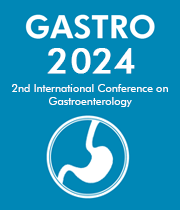Title : A treatment dilemma: Case of recurrent Helicobacter Pylori Infection in antibiotic resistant Hmong population
Abstract:
As H.pylori cases are increasing in the world, clinicians should be aware that H.pylori resistance rates to metronidazole and fluoroquinolone are variable geographically but highest in Hmong populations. Our case illustrates recurrent treatment failures of H. ylori leading to use of alternative therapy and surveillance of MALToma. We share this in hopes that it raises awareness about H.pylori treatment resistance in light of increasing cases.
Case Presentation:
A 37-year-old hmong female with a history of acid reflux presented to ED with acute episodes of hematochezia with significant drop in hemoglobin requiring transfusion. Next day, endoscopy revealed mild erosions in the gastric antrum with pathology suggestive of chronic active gastritis in the setting of H. pylori with mild B cell infiltrate without dysplasia or metaplasia. Colonoscopy showed a rectal ulcer. History revealed she recently immigrated from China and belonged to the Hmong tribe and was previously treated for H.pylori infection with unknown medications. She was discharged home on quadruple therapy consisting of PPI, doxycycline, bismuth subsalicylate, and metronidazole (PBMT). Three months after completion of therapy, stool H.pylori antigen test was positive. She was then treated with PPI, amoxicillin, Levofloxacin (PAL). Two months after completion of therapy, repeat stool H.pylori antigen test was positive again. After failing two rounds of antibiotics, she was treated with PBMT with high dosage PPI and metronidazole with confirmed eradication of H.pylori on stool testing and antral biopsies. Given findings of B cell infiltrates, colonoscopy was repeated in one year and was negative for malignancy or mucosa-associated lymphoid tissue lymphoma (MALToma).
Discussion:
Globally, H pylori infection affects almost half of the world population leading to chronic gastritis, peptic ulcer disease (PUD), and gastric malignancies or MALToma. The Hmong mountain people in East Asia have high degrees of resistance to antibiotics. Most notably, resistance to metronidazole has been shown to be as high as 70%, fluoroquinolone is up to 27%, and multidrug resistance is 31%. The high rates of resistance is explained by the high frequency of infection in these groups due to lack of socioeconomic support including poor sanitation and contaminated water supply. This case underscores the importance of tailored interventions. Given the high levels of resistance found to metronidazole,alternative therapies including high dose tetracyclines or amoxicillin may be better suited in these populations. Other third line agents such as quinolones can also be considered when H. pylori infection is not eradicated after multiple trials at therapy. Initiating early alternative treatment regimens in the management of these populations at high risk for standard treatment failure should be strongly considered to prevent further complications.
Audience Take Away:
-
Recognizing recurrent H.pylori treatment failures may be related to geographical antibiotic resistance in populations. This will allow clinicians to choose appropriate and tailored treatments based on geographical backgrounds which will reduce treatment failures.
-
Hmong population in China has the highest percentage of metronidazole resistance leading to failure of treatment for H.pylori.
-
Given the high levels of resistance found to metronidazole, alternative therapies including high dose tetracyclines or amoxicillin may be better suited in these populations.
-
Other third line agents such as quinolones can also be considered when H. pylori infection is not eradicated after multiple trials at therapy.



